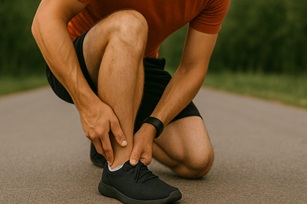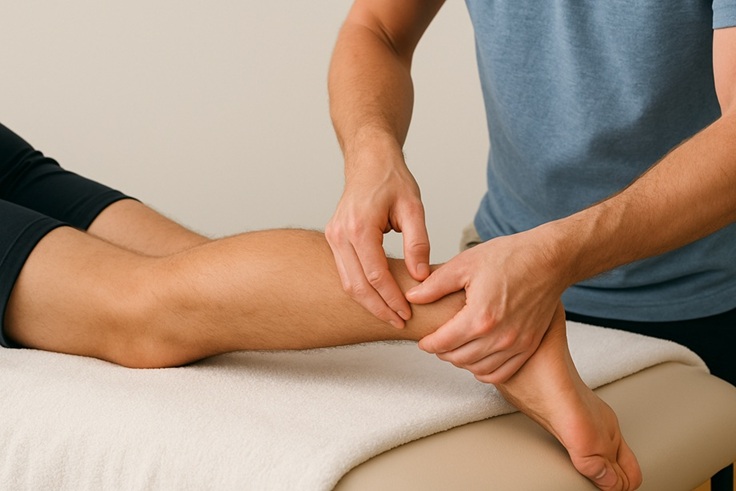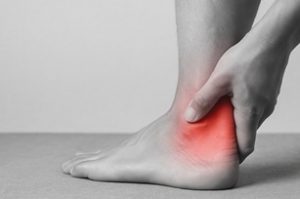Achilles issues are one of the more common pains people can experience in their life. It’s something a lot of people want help from a physio for because often the pain doesn’t go away with rest. When people tell us their story it often goes like; they tried to rest it, and then eventually the pain does resolve, and they think its better. But as soon as they get back to the normal activities, they love like hill walking or jogging the pain comes back and they’re back to square one.
If you’re suffering with pain down the back of your heel or ankle or foot pain or stiffness that feels worse after exercising or first thing in the morning it could be Achilles tendonitis.
This blog will explain what Achilles tendonitis is and the best course of action if you’re suffering with Achilles pain.
This blog is going to focus on what Achilles tendonitis is and the best course of action if you’re suffering with Achilles pain.

Achilles Pain
The Achilles tendon is the strongest and thickest tendon in the human body. It is a band of tissue located on the back of the ankle that connects your calf muscles to the heel bone. It plays a crucial role in ankle movement during walking, running, and jumping.
What is Achilles tendonitis?
Achilles tendonitis is an overuse injury to the Achilles tendon. The Achilles tendon is tough and flexible, but like any tendon, is susceptible to inflammation and irritation from repetitive stress activities.
Often there has been a change in activity which triggers the overload, so that could be restarting a sport after a break or just increasing the intensity or frequency of activities. Or even a change of footwear.
What causes Achilles tendonitis?
There are a few contributing factors for the development of Achilles tendonitis. The most common are:
A sudden increase in the length or intensity of workouts, such as running more miles or hiking up steep inclines.
Jumping into a new sport unprepared
Tight calf muscles/ restricted ankles
Age – as you get older, the tendon becomes less flexible and less able to handle stress.
What are the symptoms of Achilles tendonitis?
We often see patients in clinic with Achilles tendonitis who report the following symptoms:
- Achilles tendon pain and tenderness
- Pain down the back of the ankle or heel that worsens with activity.
- Pain or stiffness in the morning that improves throughout the day.
- Severe pain the day after a workout
- Swelling in the tendon and/ or tenderness to touch
How do you test for Achilles tendonitis?
Your physio will listen as you describe the issue you’re having. If you’re describing symptoms like the ones above, then they will assess your achillies next. Also, they’ll check your ankle ranges and calf muscles to make sure the diagnosis is correct and test for other factors that could be contributing to your achillies issue.
Is it OK to walk with Achilles tendonitis?
If like most people your tendon isn’t ruptured, then you can walk on it. Sometimes we have to adjust footwear to de-load the Achilles to make walking more comfortable. And we can give you advise around how far to walk after assessing it carefully.
treating achilles tendonitis

How to treat Achilles tendonitis?
Achilles tendonitis responds well to physiotherapy being the first line of treatment.
The most important action to take with Achilles tendonitis correcting the load! The best way to kickstart your recovery is to not over aggravate the tendon. But don’t worry, this doesn’t mean you can’t continue to be active; biking and swimming are great low-impact alternatives! And recovery involves monitoring and constantly building up the loads to get you back to your usually activities. So, it’s a very active recovery rather than just rest.
Recovery times vary from person to person, if you’re someone who has been pushing through the pain for a couple of months, your recovery will take a little bit longer than someone who has only been experiencing symptoms for a week or two.
During your recovery we can correct all the issues that contributed to the overload. Training loads, strengthen your achillies to make it more resilient. Discuss ideal footwear for your activities. And correct any tightness or restrictions around your calf or ankle that could me maying you compensate and overload your achilles.
If you are suffering with Achilles pain and are missing out on the activities you love due to pain and discomfort, give us a call on 07517421800 to get started on your road to recovery.
Other Free Resources For Achilles Pain
Video – Calf Stretches You Could Be Doing Wrong
On social media? Follow us on Facebook or Instagram

